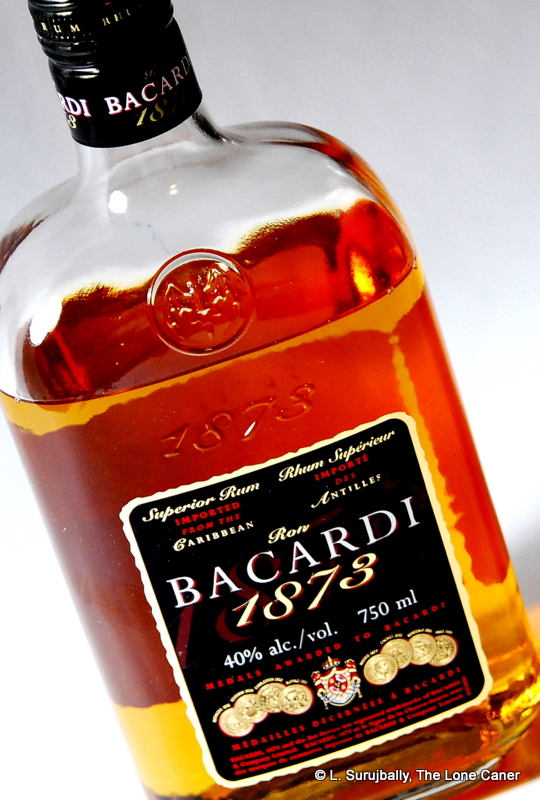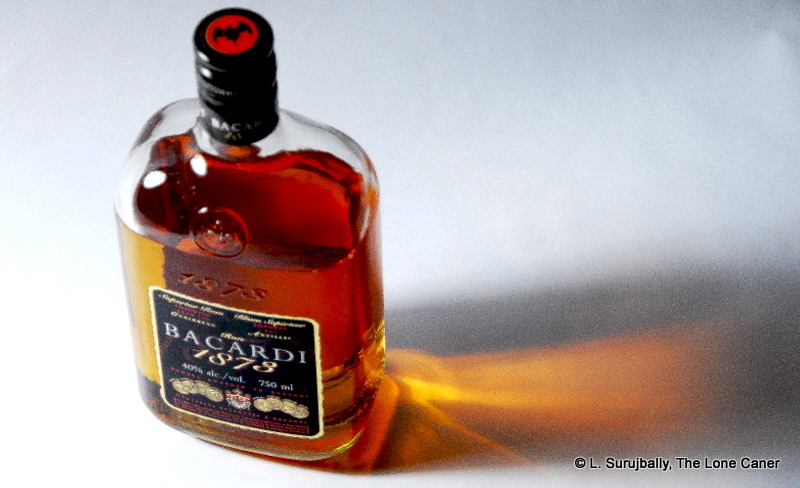First Posted 27 Nov 2010 on Liquorature
A pleasant mixer but not worth it as a sipper…like a date you want to kiss but really aren’t sure you want to bring home just yet.
I’m at a loss to say what Bacardi 1873 is, based on what I’m reading. Research is maddeningly inconclusive: is it a solera, as some bottles advertise themselves to be, or a standard blend of some kind? Some sources suggest that it’s an aged blend that has now been replaced by the eight year old. I hesitate to commit myself to any of these positions, because while I can tell my bottle is definitely not marked as a solera (that is usually clearly identified as such on the bottle, and the one I sampled makes no mention of it), I can’t ascertain anything else.
It would also appear that the few rum reviews out there are at odds on whether it is discontinued or not, and if so, replaced by what. Bacardi’s own (woefully inadequate) website is hardly a fount of information on the matter and thus far they have ignored my inquiries. On the other hand, Chip Dykstra of the Rum Howler Blog was as helpful as ever, and responded that while the 1873 started life as a Solera made in Puerto Rico, production was subsequently moved to Mexico and the specialized solera method was discontinued.
Faced with this dilemma, a reviewer does what he can: he directs an inquiry at the distiller, does as careful a tasting as he is able, and puts a picture of the bottle up to ensure that readers know precisely what they’re reading a review of. And this is what I’ve attempted to do.
Price wise, nothing to say. About $35. Bottle, not the rounded shape of the standard Bacardi’s like Black, Gold or White, but more squared off. Cap is a cheap crap tinfoil press-on. I won’t go so far as to say these initial indications denote low-end, but it does seem to be trending that way. On the other hand, I like the rich and deep amber-gold colour of the rum as the light strikes it (something I’ve attempted to show in the picture I took).
Working on the assumption that this is a blend, the trick is to see if a decent tasting can suggest, with a fair degree of assurance, whether it’s an old or young one running up the spine.
 On those nose, there is a surprising lack of any kind of spirit burn on the initial sniff, just soft vanilla notes wrapped around a caramel and burnt sugar core. There is a hint of oaken tannins on the back end which suggest some level of ageing, but it’s impossible to say how much: the relatively simple nose doesn’t lend itself much to dissection. I need to mention, though, that after I left my glass to stand for a bit, a sly citrus hint came sliding out of the softer background of vanilla.
On those nose, there is a surprising lack of any kind of spirit burn on the initial sniff, just soft vanilla notes wrapped around a caramel and burnt sugar core. There is a hint of oaken tannins on the back end which suggest some level of ageing, but it’s impossible to say how much: the relatively simple nose doesn’t lend itself much to dissection. I need to mention, though, that after I left my glass to stand for a bit, a sly citrus hint came sliding out of the softer background of vanilla.
The palate confirmed the overall lack of complexity the nose had suggested. The body of the 1873 was lighter than I expected for something of this copper-brown/amber coloured hue; and slightly sweet without overpowering you with sugar, and a shade dry (not as much as the Bermudez, however). The rum is spicy, packing a light stinging burn on the tongue, yet perseverance elicits the taste of dried fruits as well, the non-sweet kind, like dates, perhaps; this last is very faint and is no more than a light impression. As for the finish, it’s short and sharp, and the medicinal fumes which thus far escaped you are back to claw their way up your throat and spoil what so far had been an unremarkable, but also not particularly bad, rum.
I’m really not impressed with the 1873 on its own – this one seems to be tailor made for a cocktail base of some kind, and indeed, as a mixer with the usual suspects, I really enjoyed it. I believe it to be a blend of rums aged no more than five years. As a sort of general product, it doesn’t try to be any one thing, but too many, and there we may have hit on the reason for its lack of success with me. The makers never got around to hanging their hat on any kind of flavour profile, while trying to please everyone: that marks it out as a low-ender, to my mind.
I sometimes wonder how much rum-lovers’ tastes the world over are formed from early exposure to the best selling rum in the world. When you think about it, drinkers who start with scotch appreciate the drier, not so sweet variations that hark back to whisky and cognac, while also liking the sweeter, more full-bodied stuff; but drinkers who began with Bacardi and never strayed from the true faith tend to like the former somewhat less, and concentrate their love on the latter. This private theory of mine is anecdotal at best, but who knows.
Be that as it may, Bacardi 1873 is a pleasant blend of no great sophistication, and sports its youthful physique and unpretentious nature like any teenager that ever lived but fails on the finish line. It’s main selling point might be that it’s a cut above the black and gold variations, and works exceedingly well as a mixer. For some, it might work as a low-end, none too stellar sipper (something like the El Dorado 5 yr or English Harbour 5 yr)…not for me, though.
(#049)(73.5/100) ⭐⭐½
